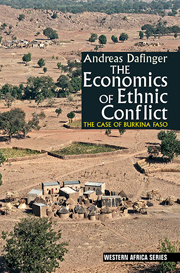Book contents
- Frontmatter
- Contents
- List of Maps
- List of Figures and Tables
- List of Acronyms
- List of Vernacular Expressions
- Acknowledgements
- Dedication
- 1 Introduction
- 2 The logic of global relations: Burkina Faso, Boulgou and the world
- 3 Sharing the land: The ethnic division of labour
- 4 Conflict
- 5 Concealed economies: The hidden dimension of conflict and cooperation
- 6 Conclusion
- References
- Index
6 - Conclusion
Published online by Cambridge University Press: 05 October 2013
- Frontmatter
- Contents
- List of Maps
- List of Figures and Tables
- List of Acronyms
- List of Vernacular Expressions
- Acknowledgements
- Dedication
- 1 Introduction
- 2 The logic of global relations: Burkina Faso, Boulgou and the world
- 3 Sharing the land: The ethnic division of labour
- 4 Conflict
- 5 Concealed economies: The hidden dimension of conflict and cooperation
- 6 Conclusion
- References
- Index
Summary
This book began by looking at the question of whether the world has seen a growth in local, small-scale conflicts over the past decades. It suggested looking instead at the increased interest in such local conflicts. The previous chapters have shown the changes in the way these conflicts are framed and perceived; defining criteria, such as ethnic stereotyping and the ethnic division of labour, are not only historically rooted categories of a local economy but also responses to a national and global discourse over ethnicity. On the one hand, strategies of accessing and controlling local resources build on the delineation of groups along ethnic lines, emphasizing the ascription of stereotypical values to a social group, and on the other, the state administration and development organizations pursue policies that are implicitly shaped by ethnic criteria. The differential treatment of Fulbe herders by the administration may simply be a case of perceived injustice and ethnic bias, as in the example of Kourbila in Chapter 4; and in other cases the exclusion of Fulbe from access to infrastructural and administrative resources can be quite real as the practice of the geographical institute and the official villages' register illustrated. The administration's policy is non-ethnic, and uneven access to resources is based on formal non-ethnic criteria. Whether certain groups meet these preconditions, however, is largely determined in a local, highly ethnicized process, as in the politics of size (Zarga) or the denial of land rights to Fulbe have shown.
- Type
- Chapter
- Information
- The Economics of Ethnic ConflictThe Case of Burkina Faso, pp. 181 - 184Publisher: Boydell & BrewerPrint publication year: 2013

